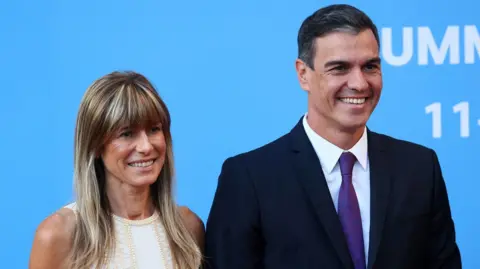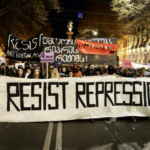Introduction
Seven years after rising to power on a platform to clean up Spanish politics, Prime Minister Pedro Sánchez scandal now faces his toughest political crisis yet. A growing web of corruption scandals surrounding his Socialist party (PSOE) has emboldened opposition calls for his resignation and threatens the stability of Spain’s coalition government.
Audio Leak Sparks New Corruption Allegations

On 12 June, civil guard investigators released audio recordings appearing to show Santos Cerdán, the PSOE secretary and one of Sánchez’s closest allies, discussing commissions allegedly paid by companies in exchange for lucrative public contracts. Although Sánchez himself has not been directly implicated, the revelation struck a major blow to the prime minister’s credibility and image Pedro Sánchez scandal.
Cerdán resigned from his party post and parliamentary seat and is scheduled to testify before Spain’s Supreme Court on 25 June. He maintains his innocence, denying any criminal involvement. The ongoing investigation also implicates former PSOE transport minister José Luis Ábalos and his adviser Koldo García. All three deny wrongdoing.
Mounting Pressure from the Opposition
The Spanish opposition, led by the conservative People’s Party (PP) and the far-right Vox, has seized on the scandal, accusing Sánchez’s administration of systemic corruption. In Parliament, PP leader Alberto Núñez Feijóo accused Sánchez of being “a wolf who has led a corrupt pack,” while MPs chanted “Dimisión” (Resign).
Adding to Sánchez’s troubles are investigations into his own family. His wife, Begoña Gómez, faces judicial scrutiny for alleged business irregularities, while his brother David Sánchez is due to stand trial for alleged influence peddling. The Attorney General, Álvaro García Ortiz, also faces charges for leaking confidential tax information. All involved deny any wrongdoing.
Allegations of Politicized Investigations

Sánchez and his allies have dismissed the corruption probes as politically motivated attacks orchestrated by the right-wing opposition, parts of the judiciary, and sympathetic media outlets. Some legal experts have expressed concern about the unusually aggressive pursuit of these cases, suggesting political interference in the judiciary.
“There are many issues that affect the lives of the majority – healthcare, housing, pensions, jobs, fighting climate change and defending equality – and for which it is worth fighting still,” Sánchez wrote in a letter to PSOE members as he doubled down on his refusal to resign.
A Fragile Coalition Government
Spain’s current government remains heavily dependent on a fragile coalition of left-wing parties and regional nationalists, including Catalan and Basque groups. Cerdán played a pivotal role in securing their support after last year’s election.
Now, maintaining that coalition will be crucial for Sánchez’s political survival. According to polling expert Paco Camas from Ipsos, any resignation by Sánchez could spark elections that would almost certainly hand power to the PP, likely with Vox’s support, given the left’s current electoral demobilization.

Even Socialist leaders such as Emiliano García-Page, president of Castilla-La Mancha, have warned that “there is no dignified way out” for PSOE if the crisis worsens.
Upcoming Budget Vote Could Decide Sánchez’s Fate
One key test ahead will be securing passage of the 2026 budget. If Sánchez can hold his coalition together and push the budget through, he may buy valuable time. However, any new revelations or indictments could quickly unravel his political support.
As Camas observes: “The left is demobilized right now, while the right is fully mobilized and capitalizing on discontent.”
Nato Summit Looms Amid Political Turmoil
The scandal also casts a shadow over Sánchez’s international profile as he attends the upcoming Nato summit in The Hague. The prime minister faces increasing pressure from Washington and Nato leadership to boost Spain’s military spending beyond the current 2% of GDP target. Sánchez has resisted calls to increase defence spending to 5%, calling such a figure “unreasonable” and “counterproductive.”
Conclusion: Sánchez at a Political Crossroads
For now, Pedro Sánchez remains defiant. Yet, the combination of ongoing judicial investigations, public discontent, and opposition attacks leaves his government on increasingly shaky ground. With his fragile coalition under strain and more legal developments looming, Spain’s prime minister faces the most serious political battle of his tenure.
Whether Sánchez can weather this storm or whether new revelations force a government collapse remains to be seen. One thing is clear — Spain’s political landscape has entered a period of unprecedented volatility.
Read the full timeline of Spain’s unfolding political crisis here.
Further reading:
- BBC: Spain’s embattled PM Sánchez defies clamour for resignation
- The Morning News Informer: PSOE Corruption Scandal 2024
- Politico: Sánchez Resists Resignation Pressure
Share Your Thoughts
Will Sánchez survive this latest corruption storm? Share your opinions in the comments and subscribe for more in-depth European political coverage.









